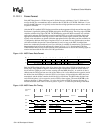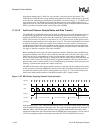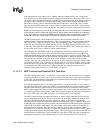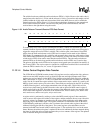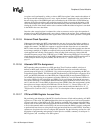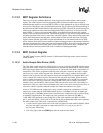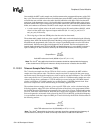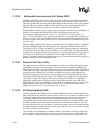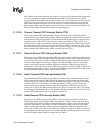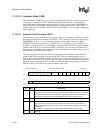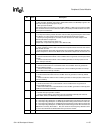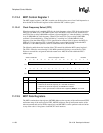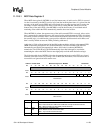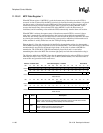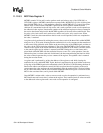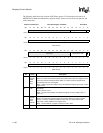
SA-1100 Developer’s Manual 11-155
Peripheral Control Module
MCP within a receive data frame, the data valid bit is reset to zero for subsequent data frames until
a new A-to-D sample is triggered and transmitted to the MCP. In this mode, the user should
program ADM=0. In the other mode, the data valid bit is set once when the first A-to-D conversion
is made and is placed in the receive data frame. However, the data valid bit remains set and the
MCP cannot determine when new A-to-D conversions are available within the incoming frame.
Programming ADM=1 prevents multiple copies of the same A-to-D conversion to be placed in the
FIFO, storing samples only when the sample rate counter times out.
11.12.3.6 Telecom Transmit FIFO Interrupt Enable (TTE)
The telecom transmit FIFO interrupt enable (TTE) bit is used to mask or enable the telecom
transmit FIFO service request interrupt. When TTE=0, the interrupt is masked and the state of the
telecom transmit FIFO service request (TTS) bit within the MCP status register is ignored by the
interrupt controller. When TTE=1, the interrupt is enabled, and whenever TTS is set (one), an
interrupt request is made to the interrupt controller. Note that programming TTE=0 does not affect
the current state of TTS or the telecom transmit FIFO logic’s ability to set and clear TTS; it only
blocks the generation of the interrupt request. Also note that TTE does not affect generation of the
telecom transmit FIFO DMA request, which is asserted any time TTS=1.
11.12.3.7 Telecom Receive FIFO Interrupt Enable (TRE)
The telecom receive FIFO interrupt enable (TRE) bit is used to mask or enable the telecom receive
FIFO service request interrupt. When TRE=0, the interrupt is masked, and the state of the telecom
receive FIFO service request (TRS) bit within the MCP status register is ignored by the interrupt
controller. When TRE=1, the interrupt is enabled, and whenever TRS is set (one), an interrupt
request is made to the interrupt controller. Note that programming TRE=0 does not affect the
current state of TRS or the telecom receive FIFO logic’s ability to set and clear TRS; it only blocks
the generation of the interrupt request. Also note that TRE does not affect generation of the telecom
receive FIFO DMA request, which is asserted any time TRS=1.
11.12.3.8 Audio Transmit FIFO Interrupt Enable (ATE)
The audio transmit FIFO interrupt enable (ATE) bit is used to mask or enable the audio transmit
FIFO service request interrupt. When ATE=0, the interrupt is masked and the state of the audio
transmit FIFO service request (ATS) bit within the MCP status register is ignored by the interrupt
controller. When AT=1, the interrupt is enabled, and whenever ATS is set (one), an interrupt
request is made to the interrupt controller. Note that programming ATE=0 does not affect the
current state of ATS or the audio transmit FIFO logic’s ability to set and clear ATS; it only blocks
the generation of the interrupt request. Also note that ATE does not affect generation of the audio
transmit FIFO DMA request, which is asserted any time ATS=1.
11.12.3.9 Audio Receive FIFO Interrupt Enable (ARE)
The audio receive FIFO interrupt enable (ARE) bit is used to mask or enable the audio receive
FIFO service request interrupt. When ARE=0, the interrupt is masked, and the state of the audio
receive FIFO service request (ARS) bit within the MCP status register is ignored by the interrupt
controller. When ARE=1, the interrupt is enabled, and whenever ARS is set (one), an interrupt
request is made to the interrupt controller. Note that programming ARE=0 does not affect the
current state of ARS or the audio receive FIFO logic’s ability to set and clear ARS; it only blocks
the generation of the interrupt request. Also note that ARE does not affect generation of the audio
receive FIFO DMA request, which is asserted any time ARS=1.



